As I make my way through Assassin’s Creed: Odyssey, I am often struck by how confident it is in itself. The action is a more polished version of Origins, its storytelling stands on firmer footing, and overall, I find the Greek world more interesting than Egypt. And that’s not just because of personal preference.
Rather, it’s because the combination of these and other factors make Odyssey feel like the game Origins was trying to be.
In this full review Assassin’s Creed: Odyssey, we’ll discuss the story and the content, as the series has always lived and died on its writing.
A Tale of Two Parts
For me, one of Origins’ biggest problems was the way it split its narrative even further than the series usually does. Assassin’s Creed: Odyssey has one protagonist around which the game revolves, with a large and interesting supporting cast.
Their story doesn’t begin, as the series’ narratives often do, with a revenge plot. Rather, it’s simple pragmatism that sends our hero on their way into the wider world.
Ubisoft’s writers continue to add wrinkles to this easier entrance into the story, but not at the breakneck pace most players of the series are used to. This time, rather than hit us squarely with a grand conspiracy, Odyssey takes its time, introducing mechanics, characters, and plotlines at a pace that allows for actual comprehension.
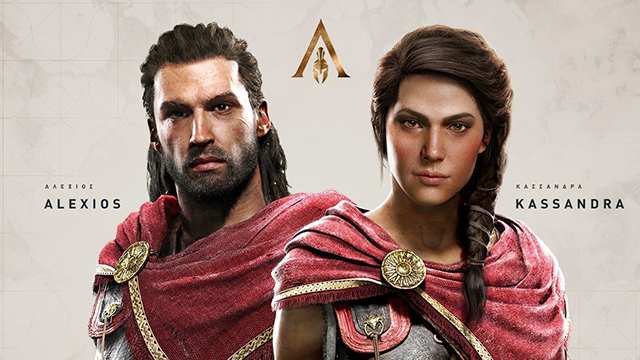
People Make it Matter
One of the initial highlights for me was the main character’s position in the world. They don’t initially have a reputation, aren’t part of some guild or noble house, and they certainly don’t seem to follow the creed of the Templars or Assassins. They are a normal, if competent, person who sees opportunities and takes them.
More interestingly, they aren’t the naive kind of protagonist I’m used to seeing at the start of an Assassin’s Creed game. Instead, they understand the world in which they live and are satisfied learning more about it as their journey unfolds — they aren’t usually surprised by the darkness and suffering they see.
These were good qualities, as I expected our hero to change and grow as the story went on.
I’m sorry to say I was disappointed.
The same qualities that at first made the main character (whose gender is up to the player) unique and enjoyable in the end made them flat and relatively hollow. Certainly, their reactions to some of the revelations the story throws at them are believable enough, and there were some genuinely touching moments that involved the main character, but they weren’t because of them.
Thankfully, the supporting cast was there to lighten the mood, as each does, in fact, have roundness and color. Every major NPC — and even some of the minor ones — in the game felt like a person, with regrets, desires, and dreams that related to their situation in life. The protagonist’s past, which is actually quite important to the story, acts just as window dressing even when things get serious, and never really moved me.
My family, friends, lovers, and enemies, though? These were people I cared about because they were actually people who were as unsure about their lot in life as you or me, and made due the best they could with what fate dealt them.
Even with Ubisoft leaning heavily into the reputation of some of the more important figures, people who helped define what it means to live in Western society, I was rarely left wanting more of their character, because to ask for more was to ask for a super-person, and those are boring. The NPCs in Odyssey are well constructed and are the real drivers for the game.
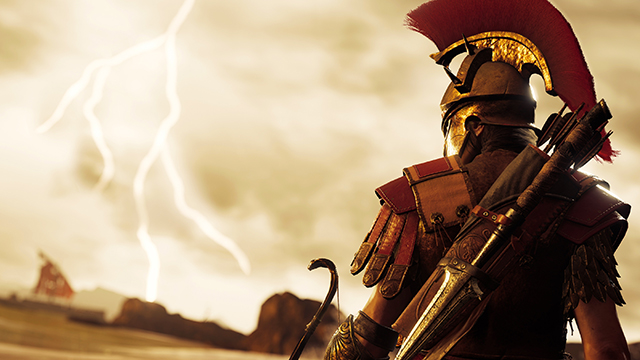
The Plot Thickens
As for the narrative itself, the common threads are here. Someone or something is pulling strings, the main character is somehow involved and becomes more so, their decisions will decide the fates of thousands, no one who appears to be of consequence (read: with a unique and higher quality character model) is exactly who they say they are, etc. etc.
What impressed me, however, is how Ubisoft managed to weave as many story threads together as they did. Though there’s the main story for players to follow, it certainly isn’t the only one, and each plotline has direct connections to the others, and each was interesting enough that I was always curious where the story would go next.
Some of the twists and turns were, sadly, predictable in an almost comic-bookish kind of way. I called several of them in the first couple hours of play. There were also moments where it felt like Ubisoft was putting in fantastical things just to get a rise out of their players, trying more to force a reaction than let it happen organically.
Still, I was satisfied for the most part. The formula Ubisoft established is well intact, but Odyssey chooses to play with it in subtle ways that make what would be old news fresh(er) again.
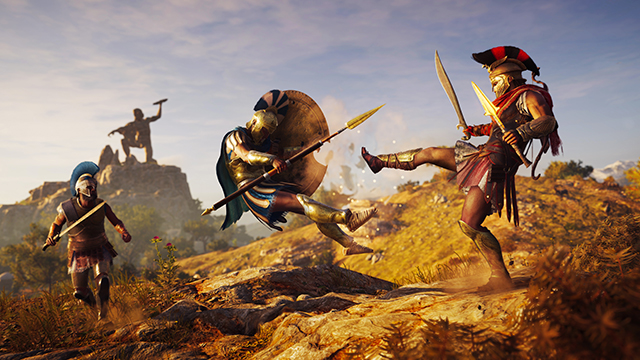
Solid Content
As with Origins, Assassin’s Creed: Odyssey follows a more RPG style of gameplay, with character and enemy levels, a randomized loot system with rarity scores, health values, and skill trees all making up a solid, if not revolutionary, whole.
For me, though, the core gameplay in Odyssey is not what brings me the most joy. It’s a moderate expansion on a system that functions, and I’m fine with that. I’m most taken by the small quality of life improvements Ubisoft’s made. Most of the ideas come from other games, but they’re implemented into the world well enough that I’m more than happy to take part.
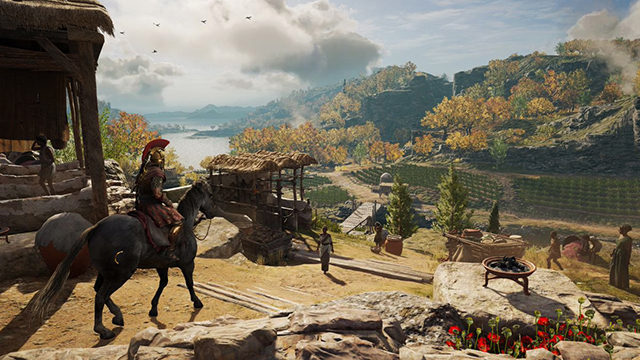
The Option to Enjoy
My favorite new side mechanic is bounties. Collected from a notice board, they come in several varieties and all offer either money, loot, experience, or some combination of the three. They don’t take very long, they occasionally weave their way into the larger world, and the reward is usually worth the small effort it takes to complete them.
More importantly, you’ll want to pick up bounties and side content frequently, as story content is often gated behind a level cap. Especially as you approach the late game, Odyssey‘s main storyline takes longer and longer as you have to take more and more time doing optional content so the enemies in the core content don’t kill you in a single hit.
This is an annoying design decision that forces the player to engage with the world against their will. It works in games like Destiny or The Witcher 3 because the main story — many people’s reason for playing the game at all — is perfectly playable with little to no grinding required. Odyssey all but forces the issue, and in a game all about choosing how you approach something, such a heavy hand stands out.
On the flip side, I really enjoyed how armor customization matters in this game. The Origins system of standardized outfits is gone and head-to-toe gear with stats is in. And unlike previous titles, the overall aesthetic of the gear changes, and might even inform its stats. There are also specialized sets with accompanying bonuses, so there’s yet more reason to seek out the hidden areas of the map.
The other bits of side content — the Shadow of Mordor-inspired Mercenary system, a pared down version of the Assassin’s Creed 4 sailing mechanics, the various one- or two-step side quests, the arena — are all fun as well, and for the same reasons they’ve worked in the titles they originated in. It’s just that they can really get in the way sometimes.
The number of times I suddenly found myself in a sea battle in spitting distance of the objective was incredibly frustrating, especially since pirating doesn’t have the same charm or reward it did it Black Flag.
Mercenaries is a nice addition, though. There might not be any real consequence to the GTA-style bounty system, but finding a mercenary I hadn’t encoutered yet was always a real thrill, as I knew the subsequent fight would be both tense and satisfying.
It’s Not All Roses
The trouble with Odyssey, as with many recent Assassin’s Creed games, is how spread out the content feels, and everything ultimately feels shallow because of it.
I enjoy bounties, but they will never carry a title. The ship combat makes something of a return, but it feels tacked on, as it has in every game after Black Flag. And many optional quests were almost always some variation on “go here, kill dudes, come back.” That, and the fact that every non-story location in the game is a hostile zone really makes me wonder what purpose any location serves other than a new coat of paint on “this is a new place to kill dudes.”
The voice acting is also hit and miss. Especially in some of the randomly generated world quests, but certainly not limited to them. Some of the line deliveries are incredibly stiff, with one mechanics explanation at the game’s outset spoken so awkwardly I could tell the voice actors were just done with it that day.
Loot can pose issues, too. It’s a problem many ran into with Nioh, where you’re so overwhelmed with useless gear that managing it became a game all its own, and not one you wanted to play. Again, bounties are good for giving a possible upgrade, but the game completely floods you with common items you’ll never so much as swing.
Last is an issue I saw pop up in Far Cry 5. Odyssey does not want you to ever be bored and so tends to contrive reasons for you to engage with its world. Whether that means spawning a random patrol or NPC recruitment quest, I often find myself bombarded by things I don’t have the time or desire to discover. And sometimes I just want to walk through the city without being attacked by guards. Is that too much to ask?

Final Verdict
Assassin’s Creed: Odyssey is one of the better entries in the franchise, especially in recent years. Its side characters are solid, and I care about their personal conflicts and motivations. It builds on the systems established in Origins without trying to reinvent them, and the gameplay loop and core mechanics remain fun and engaging. The game does try to do a little too much of everything, and the experimenting it does do — a player-driven protagonist, for one — sometimes falls flat. Odyssey also has its overbearing moments, too, and I wish parts of its story didn’t drag on for so long.
In the end, I was pleasantly surprised by Assassin’s Creed: Odyssey. It’s a beautiful world that’s had real care and attention paid to it, and a worthy entry in a series that shows no signs of slowing down.
[Note: The developer provided the copy of AC: Odyssey used in this review.]

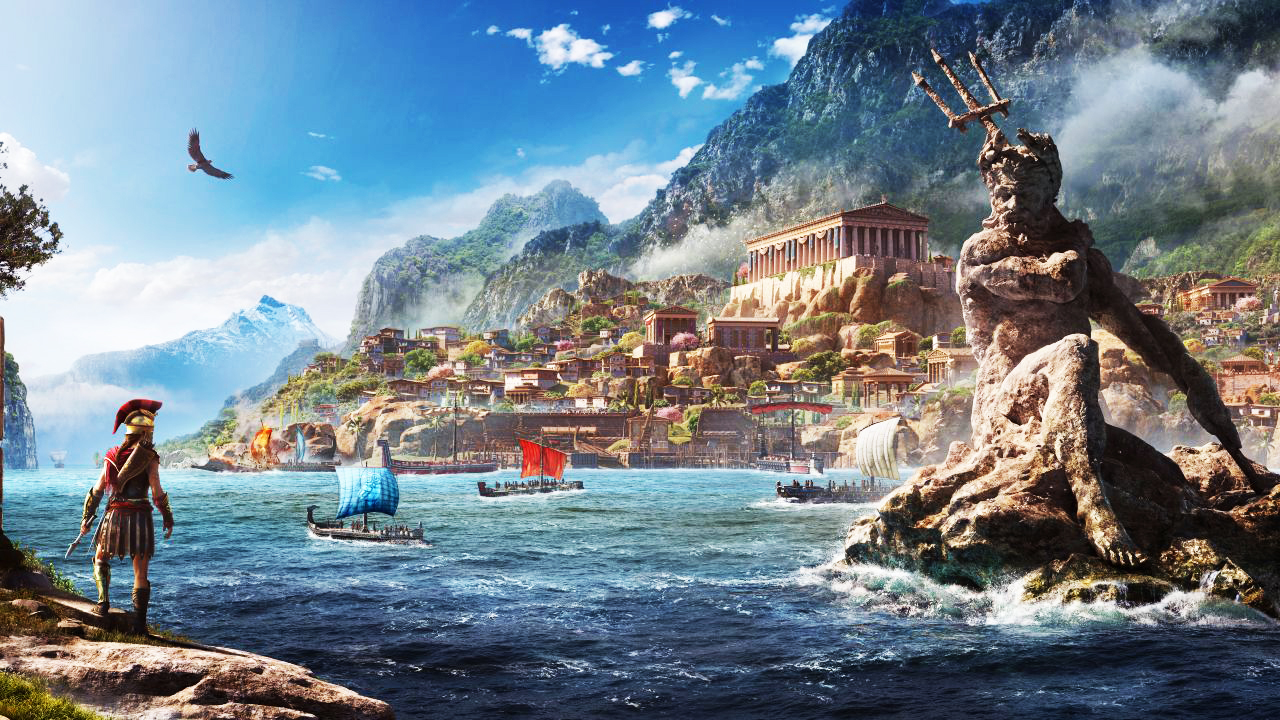
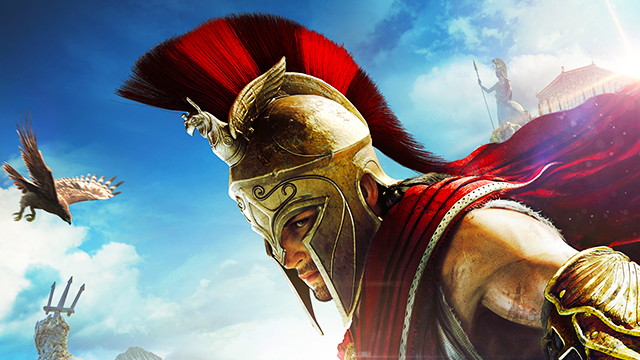
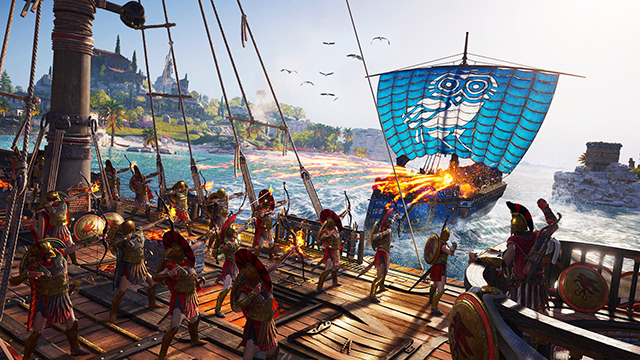





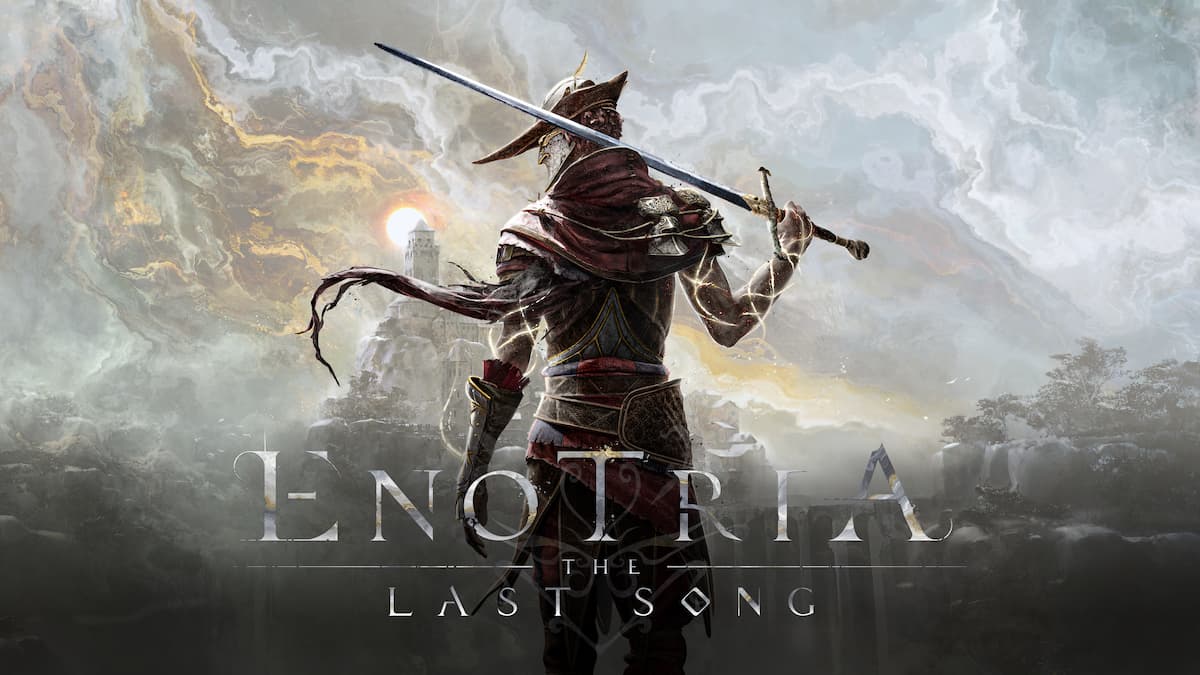
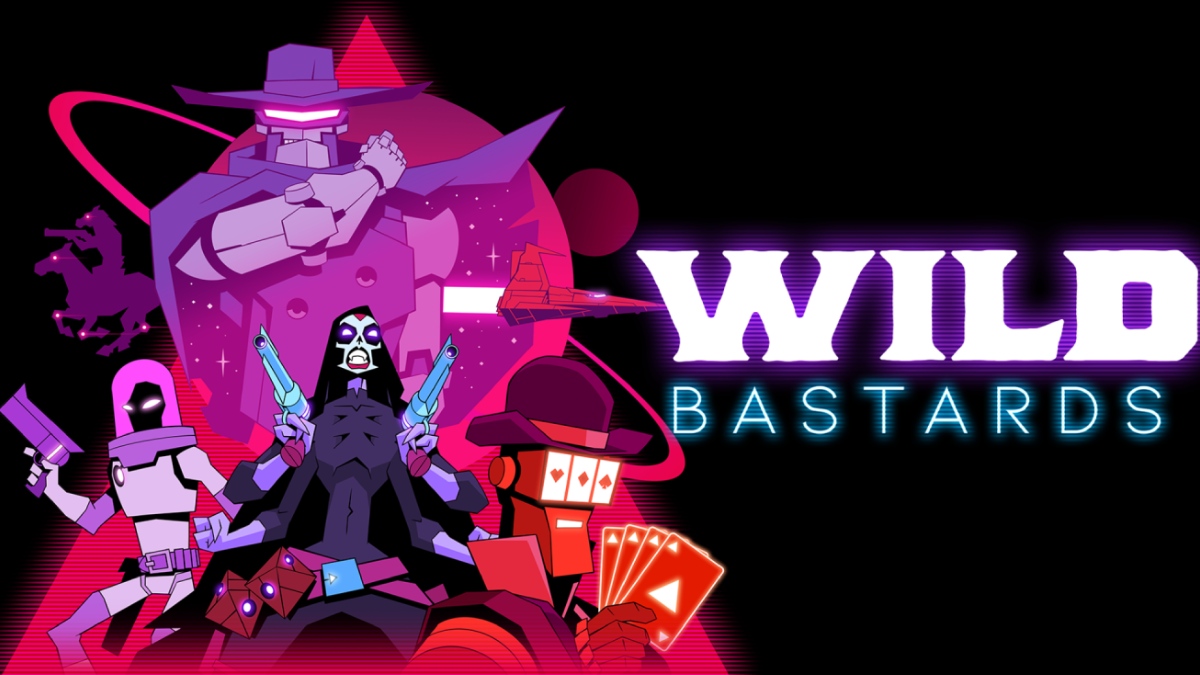

Published: Oct 1, 2018 05:43 pm